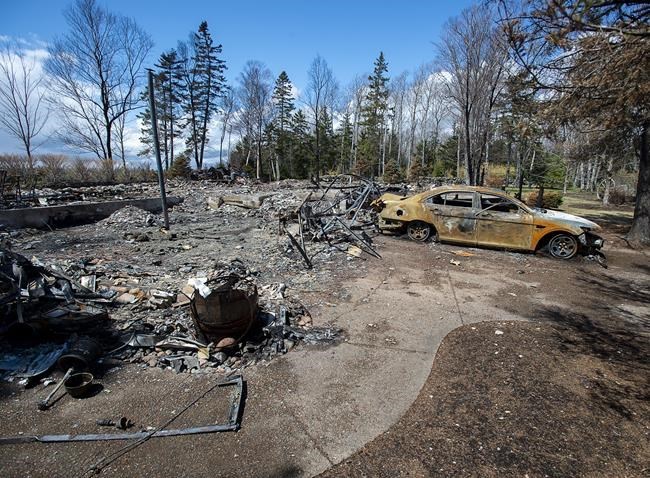HALIFAX — Domestic violence extended back generations in the family of the man who carried out the 2020 mass shooting in Nova Scotia, a document released Monday by a public inquiry reveals.
The summary produced by the commission probing the shooting describes disturbing episodes in the killer's life that range from his mistreatment as a child through his adult diagnosis as a "narcissistic personality" whose rage could erupt in a moment.
On April 18-19, 2020, Gabriel Wortman went on a 13-hour rampage that began after he assaulted his spouse and then drove a replica police vehicle, killing 22 people with his illegally acquired guns.
The public inquiry says it was "not successful" in speaking to some members of the killer's family, but investigators pieced together an account of the family's violent past from police statements from four uncles, written documents and some interviews with family acquaintances and the killer's spouse.
Alan Wortman, the killer's uncle, told the RCMP that the killer's paternal grandfather "was violent" with his children, including the killer's father, and that this pattern continued into the perpetrator's upbringing.
In 2010, Neil Wortman, another of the killer's uncles, wrote a letter to Jeff Samuelson, the killer's biological brother, warning him of deep "family dysfunction" in the couple who had given him up for adoption in the United States.
The letter said the "violence extended at least two generations back, to the perpetrator's great-grandfather," the commission document says. The great-grandfather was described as a "tyrant who brutalized his family" and passed on these traits to his own son.
Several witnesses told the RCMP that the killer's father, Paul Wortman, abused his wife and that he also mistreated his son during his childhood in Moncton, N.B.
One of the killer's uncles, Alan Wortman, told the RCMP that as a teenager he saw Gabriel Wortman's father assault his wife at a Christmas dinner. "She said something and he struck her, knocked her onto the floor and kicked her and kicked her and kicked her," he told police. "I said, 'You have to stop doing that. Stop it.'"
Another uncle, Glynn Wortman, who babysat the killer when he was a toddler, is reported as telling police that he once witnessed Evelyn Wortman being choked by her husband.
"The (perpetrator) had a horrible upbringing and that ... turned him into a greedy, overbearing little bastard," Glynn is quoted as telling police after the shootings. "He (the killer's father) never treated him like a little boy."
Lisa Banfield, the killer's spouse, and several other witnesses have recalled Gabriel Wortman telling them that when he was a child his father handed him a loaded gun and asked him to fire it at him. Banfield told police the perpetrator told her, "I was so close to shooting him."
Other stories included accounts of the young Gabriel Wortman witnessing gun threats to his mother, while Banfield also told police that the killer felt he couldn't trust his own mother, as she "would tell on him all the time, knowing he's going to get beaten or whatever."
The legacy of a dysfunctional relationship with his parents emerged in Gabriel Wortman's adult life, according to the relatives and his spouse.
The summary includes Paul Wortman's account to policeof how during a vacation in Cuba his adult son attacked him during a discussion about the killer's childhood, with the son beating the father to the point he "lost a bit of vision" in one of his eyes.
A 2010 threat to kill his parents was investigated by police after Glynn Wortman called the RCMP to report the killer's intentions. The summary says Paul Wortman told investigating officers his son had guns. He repeated the allegation during another probe in 2011, when a police intelligence memo was circulating suggesting Gabriel Wortman posed a threat to police.
In the decade that followed, the killer decreased contact with his parents, rarely speaking to them, according to the summary.
According to the medical records released in the document, a doctor referred Gabriel Wortman to psychiatrist Dr. Douglas Maynes in 2000, who saw him four times and diagnosed him as a "narcissistic personality."
In June 2009, Dr. Cynthia Forbes, a Halifax-area family doctor, wrote in her notes that the killer was reporting "that he drank 12 beers a day, five days a week," yet he believed he could quit drinking over the summer months. She suggested he see a psychologist, "but he wasn't interested at this point."
According to the medical records obtained by the inquiry, the only medical treatment the killer received from June 2018 to January 2020 were seven visits with Dr. Forbes and a colleague for high blood pressure.
Wortman was shot dead by police at a gas station in Enfield, N.S., on April 19, 2020, ending one of the worst mass killings in modern Canadian history.
This report by The Canadian Press was first published July 11, 2022.
Michael Tutton, The Canadian Press



